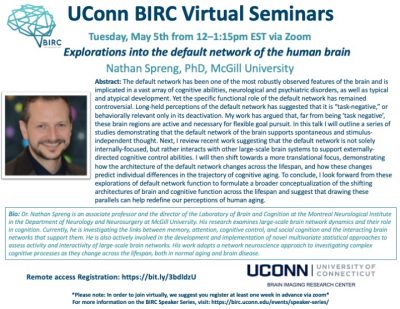McGill University
Explorations into the default network of the human brain
Tuesday, May 5th from 12–1:15pm ET via Zoom
**Register here for Zoom using your institution/university email address**
Bio: After receiving a Ph.D. in cognitive neuroscience from the psychology department at UCLA in 2006, Dr. Uddin completed a postdoctoral fellowship at the Child Study Center at NYU. For several years she worked as a faculty member in Psychiatry & Behavioral Science at the Stanford School of Medicine. She joined the psychology department at the University of Miami in 2014. Within a cognitive neuroscience framework, Dr. Uddin’s research combines functional connectivity analyses of resting-state functional magnetic resonance imaging data and structural connectivity analyses of diffusion tensor imaging data to examine the organization of large-scale brain networks supporting executive functions. Her current projects focus on understanding dynamic network interactions underlying cognitive inflexibility in neurodevelopmental disorders such as autism. Dr. Uddin’s work has been published in the Journal of Neuroscience, Cerebral Cortex, JAMA Psychiatry, Biological Psychiatry, PNAS, and Nature Reviews Neuroscience. She was awarded the Young Investigator award by the Organization for Human Brain Mapping in 2017.
Abstract: Executive control processes and flexible behaviors rely on the integrity of, and dynamic interactions between, several core large-scale brain networks. The right insular cortex is a critical component of a salience network that is thought to mediate interactions between brain networks involved in externally oriented and internally oriented processes. I will describe studies examining how brain network dynamics support flexible behaviors in typical and atypical development, presenting evidence suggesting a unique role for the dorsal anterior insular from studies of meta- analytic connectivity modeling, dynamic functional connectivity, and structural connectivity. These findings from adults, typically developing children, and children with autism suggest that structural and functional maturation of insular pathways is a critical component of the process by which human brain networks mature to support complex, flexible cognitive processes throughout the lifespan.
Click here to see the full BIRC Speaker Series schedule and access recordings of past talks.
